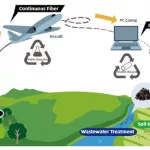According to data from the United Nations, it is estimated that the global fashion industry is responsible for 10% of global carbon emissions, 92 million tons of annual landfill waste, and 20% of water wastage. It is paramount that the fashion industry deals with waste on an urgent basis. One such initiative is seen with Ralph Lauren-Backed Materials Company, Natural Fiber Welding (NFW), a technology company commercializing sustainable materials for a circular economy, will be setting up a new facility in Illinois, USA to develop plastic-free, plant-based leather.

The facility will span over 10,000-square-feet and will be utilized to manufacture its plant-based leather product, called Mirum.
The previous year, the Ralph Lauren Corporation invested a minor sum in Natural Fiber Welding with the fashion giant mentioning that it planned to use NFW’s technology to create clothing from natural and sustainable materials.
By using substances like hemp, waste cork, coconut and vegetable oil, NFW will manufacture a product that feels and appears like conventional leather but has zero plastic resins, glues, or coatings that are else used by other plant-based leather alternatives making it 100% free of petroleum-based plastics.
For example, things like cork powder, a by-product of making corks for wine, can be bonded with coconut fiber and as a result, robust leather with a light texture can be manufactured.
The tough mixtures are then dense with a mold making the pattern and texture of conventional leather. Brands can also send patterned textiles to NFW that can then be turned into customized, leather-like products as well as can be colored using nontoxic mineral pigments and plant dyes, which are mixed in without water.
Luke Haverhals, founder and CEO of Natural Fiber Welding clarifying why Mirum is an effective substitute to regular leather, “The foundation of the company plant, not plastic. The product has a similar cost to plastic alternatives, but can be made from agricultural waste and is fully biodegradable. Nature makes highly complex materials and makes those materials in abundance. And if people knew how to manufacture those materials that already exist at big scales, then it would profoundly change how people manufacture.”
Currently, the product is used in fashion as well as automotive industries, including in a new plant-based bag line from Bellroy. It can also be used in shoes and furniture.
(Courtesy: Textile Today)


